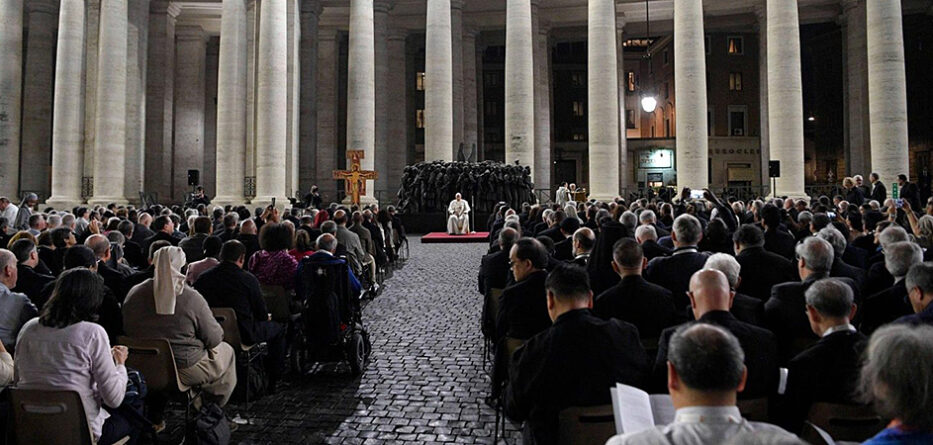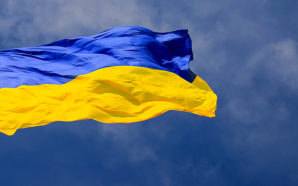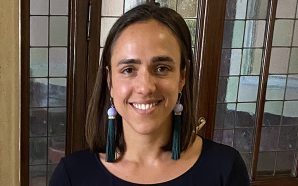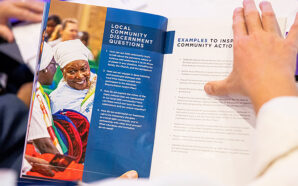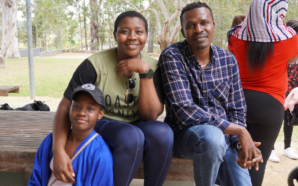Over the holiday break, Catholic Outlook is showcasing some of its most viewed, inspiring and thought-provoking articles from 2023.
Throughout October and November, Br Mark O’Connor FMS, Vicar for Communications for the Diocese of Parramatta and the Pope Francis Fellow at Newman College, University of Melbourne, reported on the Synod of Bishops on Synodality in Rome.
This was his fourth letter, originally published on 23 October 2023.
Moments of great calm,
Kneeling before an altar
Of wood in a stone church
In summer, waiting for the God
To speak; the air a staircase
For silence; the sun’s light
Ringing me, as though I acted
A great rôle. And the audiences
Still; all that close throng
Of spirits waiting, as I,
For the message.
Prompt me, God;
But not yet. When I speak,
Though it be you who speak
Through me, something is lost.
The meaning is in the waiting.
– R. S. Thomas.
Dear Friends,
A few simple and necessarily impressionistic reflections on the third week of the Synod on Synodality now follow.
I offer them amidst the hurly-burly of a truly momentous event for our Church. I hope they can be of some assistance to your following of a unique ecclesial moment in our Church’s history.
1. The waiting is in prayer – as God is our future.
Rome this week was blustery, muggy and occasionally cloudy. The traffic was more chaotic than usual because of unexpected Roman transport strikes and the wail of ambulance sirens seemed an omnipresent soundtrack!
You wait around a lot in Rome when it’s as busy as it is these days!
And I’m sure a lot of waiting and patience is being required of the delegates and all involved.
But no doubt, a tremendous amount of hard work and commitment is going into this Synod from all involved.
So, it is understandable that under the strain tensions are rising. There are a lot of words are being spoken in this beautiful synod process of small group work and general congregations.
For there are ongoing intense discussions about a range of crucial issues for our Catholic Church – all around the theme of mission. Governance, authority, the plight of migrants and refugees, our digital age and the role of women in the Church were passionately debated.
But, to speak personally, the most beautiful moment of the week, was for me the prayer service in St Peter’s Square for migrants and refugees on the evening of Thursday 19 October.
A spirit-filled presence pervaded St Peter’s Square. It was really a time of quiet contemplative prayer as the delegates gathered.
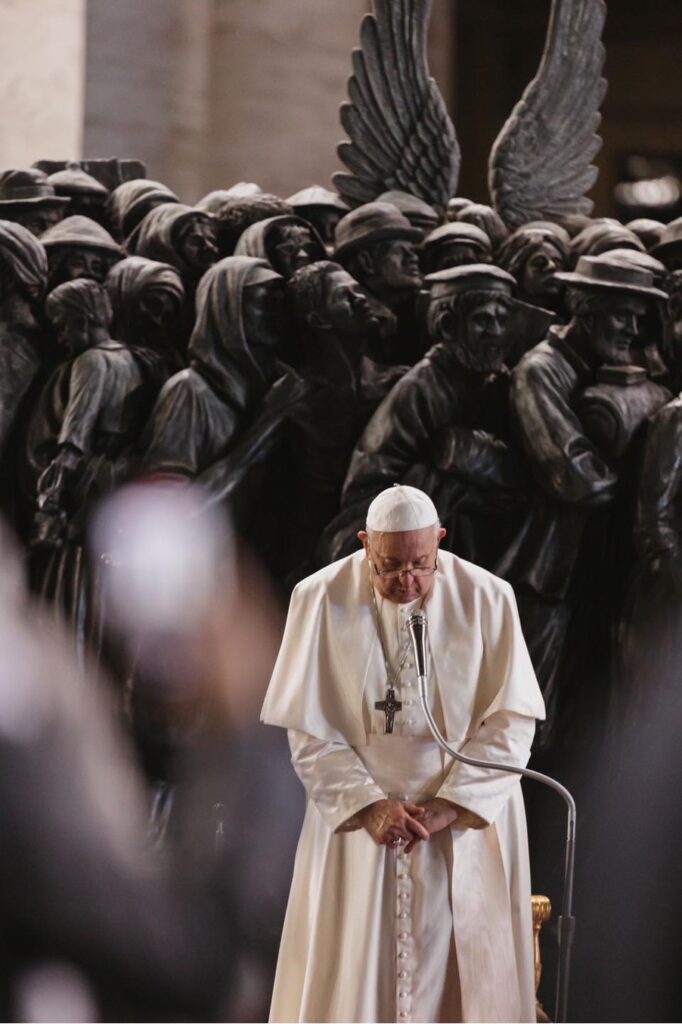
Pope Francis is seen during a prayer service for migrants and refugees in St Peter’s Square on Thursday 19 October. Image: Vatican Media
The silence was so healing…
The Holy Father led a simple prayer service for migrants and refugees that evening in front of the “Angels Unaware” sculpture in St Peter’s Square. Together with all those who joined online, it was a time of solidarity with migrants and refugees across the world.
And Pope Francis’s words were spoken from the heart: “Compassion is the imprint of God on the soul”, he said.
All present were brought back to basics. God is our future. We are in his hands. Prayer is at the core of our surrender to His divine providence. Our fundamental ‘mission’ is to act in compassion surrounded by ‘angels unaware’ and enfold ourselves in trustful prayer.
I was reminded of R S Thomas’s great poem quoted above – ‘Kneeling’ – and his profound insight: ‘The meaning is in the waiting’.
2. ‘The waiting’ is in discerning the ‘signs of the times’ for mission.
As I have said, prayer has been central to the whole synodal process. And its fruit has been how clearly energised participants have been in this third week of the Synod. Most are keenly aware that: ”Following the Spirit means following the pain-lines to join the powerless in the Spirit’s creative and redemptive work”, as Fr Enda McDonagh said.
One glimpse of a small group’s own self-description is illustrative of the scope of their discernment of the ‘pain-lines’ in our sinful but graced community of disciples of Jesus. To quote:
This week we discussed Participation, Governance and Authority: What processes, structures and institutions are needed in a missionary synodal Church. This module asked us all to reflect on the question: What processes, structures and institutions are needed in a missionary synodal Church? Our table focused on the synod as it related to episcopal collegiality. We came from around the world–cardinals, bishops, priests and laywomen, and had different vantage points–but we were united in our love for Christ and the Church. And as distinct from past Synods, the presence of so many women were a special gift.
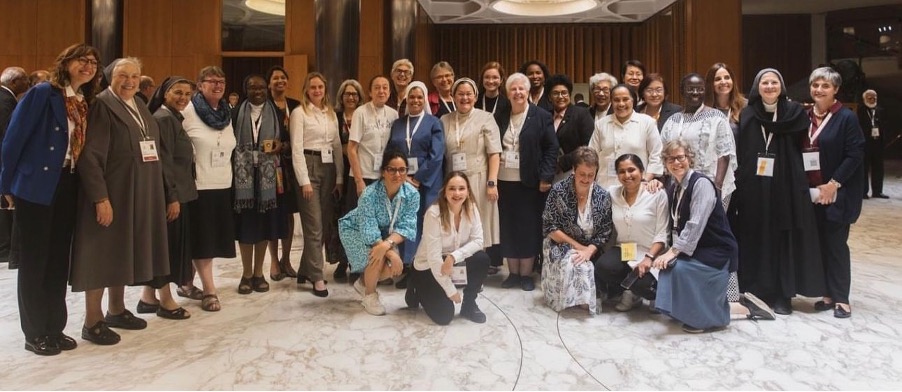
Women delegates are seen during the third week of the Synod of Bishops on Synodality assembly in Rome in October 2023. Image: Supplied
A wonderful photo: just some of the women delegates, from around the world, participating in the Synod as voting members, experts and facilitators.
This process of discernment, of course, involves what Gaudium et Spes calls ‘reading the signs of the times’. This is, of course, nothing new for our church. As the insightful Steve Millies of Chicago Theological Union points out:
Without responding to the signs of the times we would have no– Nicene Creed, Filioque, Just Wars doctrine, Curia, Celibacy Requirement (presbyteral/episcopal) Auricular Confession and Annual Duty to Confess and Missale Romanum
Nonetheless, such discernment of paths ahead does also require great wisdom. Providentially, the overall Synodal discernment is being guided by Jesuit Cardinal Jean-Claude Hollerich SJ in a firm but gentle way. I also recommend this analysis of Cardinal Hollerich’s guidance of the Synod from Tom Reese SJ.
3. The ‘waiting’ is in navigating the inevitable tensions of a global ecclesial gathering.
As intimated the Synod has not been without its tensions.
The most evident has been the result of the sheer fatigue brought on by the relentless month-long daily schedule.
And of course, in such a diverse group coming from our 1.2 billion plus Catholics, there will inevitably be theological and cultural differences.
Occasionally, you also hear that some few bishops have ‘questions and concerns’ about the canonical authority of this new type of synod that comprises bishops and now also lay and religious delegates with votes.
But I can’t personally see what they are worried about.
Unless, of course, you belong to that small group of ‘Francis–haters’ that believe that the only person the Holy Spirit can’t work through is Pope Francis! What’s the problem?
Ultimately the final conclusions of the Synod on Synodality in late 2024, will go to Pope Francis for his final discernment as the Successor of Peter.
Along with most of the People of God, I am confident the ‘sensus fidelium’ has greater trust in Pope Francis than the occasional ‘doubters – be they episcopal or lay.
4. ‘The meaning is in the waiting’ – Where to now?
So, what happens in the final week of the Synod and what follows until it reconvenes in October 2024?
The coming last week of this first session of the Synod promises is sure to be even more intense.
It is said a draft Message to the People of God will be discussed. Also, a longer document to be released next Saturday will also undergo further reflection and redrafting.
This document will go to the Holy Father and be sent back to the local churches around the global Catholic Church for further consultation leading to the second session next October 2024. In addition, working commissions will be established to feedback reports on questions that require deeper research and study.
For now, I can do no better than refer you to carefully read these two quotes from Cardinal Hollerich – as to where it’s all heading.
Cardinal Hollerich’s realism
“We are well aware that this Synod will be evaluated on the basis of the perceivable changes that will result from it. The big media, especially those furthest away from the Church, are interested in possible changes on a very limited number of subjects. I am not going to list them because we all know them. But even the people closest to us, our collaborators, members of pastoral councils, people who are involved in parishes are wondering what will change for them, how they will be able to concretely experience in their lives that missionary discipleship and co-responsibility on which we have reflected in our work. And they are wondering how this is possible in a Church that is still not very synodal, where they feel that their opinion does not count and a few or just one person decides everything. These people are especially interested in the small but sensitive changes to the issues we are preparing to tackle in this Module.”
And as for practical details about next steps in the process, the Cardinal says:
“In fact, the end of this first session of the XIV Ordinary General Assembly of the Synod of Bishops coincides with the beginning of an equally important phase of the process: the time between the two sessions, which will see us committed to returning to the Churches from which we come the fruits of our work, collected in the Synthesis Report, and above all to accompanying those local processes that will provide us with the elements to conclude our discernment next year. Thus, once back home, we will be called to a twofold task. On the one hand, we will have to disseminate the results of this first session, involving our Bishops’ Conferences, reconvening the synodal teams, activating the appropriate forms of communication in the media available to our communities, preparing the paths of experimentation and in-depth study that we will identify together as appropriate, and so on. On the other hand, we will immediately have to start planning how to collect the feedback from the local Churches, the fruits of the exchanges and the experimentation and deepening paths, so as to arrive ‘prepared’ for the second session, that is, loaded with a clearer awareness of the People of God as to what it means to be a synodal Church and above all what steps the Lord is asking us to take to become one and thus better proclaim His Gospel.”
Conclusion:
Dear friends, we spend a lot of our lives ‘waiting’ and this Synod process is certainly going to involve a lot more ‘waiting for God’! (to use Simone Weil’s phrase)
This is definitely going to disappoint and even anger various groups in the Church who are convinced they already have the ‘answers’. Those looking for quick answers to ‘hot button’ questions are sure to be dismayed with all this ‘waiting’.
But perhaps R S Thomas is on to something to ponder for us pilgrims on the long journey to the Kingdom: ‘The meaning is in the waiting’.
And so, again, I return to the witness of Dom Hélder Câmara.
Dom Hélder Câmara held a deep devotion to the Sacramental Presence of Christ in the Eucharist. He celebrated Mass daily at 6am, after his daily three hour prayer vigil, and found great comfort in the Presence of Christ housed in the Tabernacle on the wall opposite his bed in the little apartment in which he lived in the back of a church in Recife. He also had a deep devotion to the real presence of Christ in the poor and suffering.
Dom Hélder also waited patiently for renewal of our Church. In 1965, he signed the famous ‘Pact of the Catacombs’ but did not live to see a Latin American Pope begin to enact it.
Many of us in Australia vividly remember Dom Hélder’s visit to Melbourne in 1985. People were touched by his love of the suffering and the tangible sense that he was a close friend of the Risen Jesus. Dom Hélder had the ‘gift of tears’ and wept openly at the Consecration of Mass each morning. One intuited he was one with the crucified poor of Recife and also one with his Crucified and Risen Lord present in the breaking of the bread.
Yes, from Dom’s Hélder’s deep experience of ‘waiting for God’ he could pray a prayer that is surely close to the hearts of Pope Francis and all our Synod delegates:
Come, Lord,
do not smile and say you are already with us.
Millions do not know you,
and to us who do,
what is the difference?
What is the point of your presence
if our lives do not alter?
Change our lives,
shatter our complacency.
Make your word our life’s purpose.
Take away the quietness of a clear conscience.
Press us uncomfortably.
For only thus
that other peace is made,
your peace.
For further research and reading, see:
- Thaddeus Jones’ article on the prayer vigil on Vatican News.
- A new episode of Geraldine Doogue’s Plenary Matters podcast recorded right beside St Peter’s Square! Australian Augustinian Fr Tony Banks has a unique vantage point living with five of the synod delegates. He believes that this synod is cementing the notion of a church under pressure to change.
- The latest Vatican Radio podcast from the Synod: Synod General Assembly: A hierarchical and synodal Church
- Fr Timothy Radcliffe OP’s reflection from the third week of the assembly ‘The Council of Jerusalem‘
- Robert Mickens’ latest Letter from Rome: ‘Which Synod Father will be the next pope?‘
- For an insightful study of the biblical spirituality of Dom Hélder Câmara, see: https://padreroblaws.files.wordpress.com/2013/02/thebiblicalcamara.pdf
Read Br Mark’s first letter – ‘Trust the God of surprises! Letters from a listening and global Synod’
Read Br Mark’s second letter – Ear to the Ground: Letter Two from a listening and global Synod
Read Br Mark’s third letter – Put out to sea! Letter Three from a listening and global Synod




